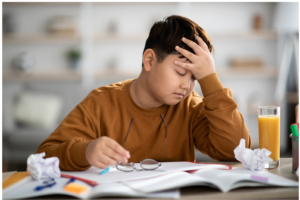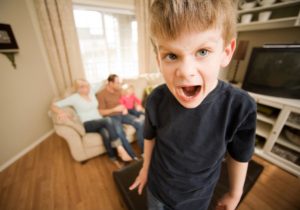How to stop yourself from "losing it" with your child

When it comes to parenting, perfection is an unrealistic goal. As much as we would all like to be emotionally attuned and sensitive to our children 100 percent of the time, even the best parents are prone to losing control and overreacting in times of stress. Many of us have witnessed or experienced the scene of a stressed out dad losing it with his child when she starts throwing a fit over a candy bar in the supermarket. Or we’ve seen the mom dragging her reluctant child into a quiet corner of a restaurant to scold him over his poor manners. In these scenarios, parents can feel like the victims of their children. They may feel judged by onlookers or trapped by their public surroundings, and what do they do? They snap! They say things they wouldn’t normally say, act ways of which they don’t approve and wind up hurting themselves and their child in the process.
Despite having the best intentions, every parent can recall a time when their frustration levels went through the roof, and their emotional responses to their children were not appropriate to the situation. Whether triggered by a large tantrum in the supermarket or a small act of defiance while getting dressed in the morning, any time we lose it, both the child and the parent are left feeling terrible. By understanding what sets off these overreactions to our children and why we feel so intensely in certain situations, we are better able to alter our behavior and improve our relationships with our children. The more we limit our own impulsive outbursts and repair the negative interactions that hurt our children, the better chance we give our kids at growing into emotionally healthy adults.
To reach this goal, we must recognize that what happened to us as children effects the way we think, feel and act as adults. This is especially true when it comes to parenting because nothing triggers feelings from our childhood more than our own children. Since our offspring resemble us in physical and emotional ways, it is easy to see them as emblems of our child selves. This over-identification leads to our reenacting incidents from our childhoods with our own children, especially the incidents that were traumatizing to us. At those times, we lose it and suddenly find ourselves treating our children as our parents treated us.
For instance, a friend of mine recently told me the story of how stressed she used to feel before taking a flight with her two young children. Though forcing a 4-year-old and 6-year-old to sit still and keep their voices down for hours at a time is no one’s favorite activity, by the time the fasten seatbelt light went off, my typically patient friend would already have come unglued. During the flight she’d find herself saying things like, “What is the matter with you? Why can’t you act like a grown up?” or “Next time, I’m not going to take you with me anywhere. Do you understand me?” At the end of the flight, instead of feeling excited to arrive at the destination and share the vacation with her two kids, my friend would feel guilty and beat, and spend days feeling like she was a terrible mother.
It wasn’t until my friend took a flight with her mother that memories of her own childhood travel experiences started to come to the surface. Every year between the ages of 4 and 14, my friend’s parents insisted she and her two siblings pile in a cramped car and drive with them across country to visit family. During these drives, tensions would build, backseat rivalries would come to a head and tempers from the front seat would flair. My friend quickly recognized that the way she was losing it with her children while in flight was exactly the way her parents had lost it with her on these road trips. She even noticed some of the things she told her children were exactly the same words that had come from her father or mother. As a mother, my friend had inadvertently taken on her parents’ stress and their reactions while traveling with kids. This insight alone helped my friend to separate from this engrained attitude, and with a few deep breaths and a sense of humor, she was able to actually enjoy coloring with her kids, telling them stories and calming them down during a flight.
Many of our intense reactions to our children are triggered by feelings from our own childhoods. We can start to separate the past from the present by looking for a pattern in the times we have lost control with our kids. As we pinpoint the source of our overreactions and trace them back to feelings or memories from when we were growing up, we can better understand ourselves and make sense of our own interactions with our children. As we become less likely to project our past onto our children, we begin to see them clearly for who they truly are, and in the process, we become better parents.
In a poll of 200 people that I recently conducted during a webinar, 100 percent of respondents said they could remember a time when their parents “lost it” with them. Yet, it isn’t always easy to recall all of the ways we were hurt as children. Many of the things that affected us when we were young do not become explicit memories that we can easily identify. On the contrary, most of our childhood pain remains in implicit memories, which exist as feelings and are just beyond our full-conscious awareness. An example of an implicit memory in action is riding a bike: you just hop on it and know how to ride without having to consciously think about it. An explicit memory, on the other hand, is the memory of someone teaching you to ride a bike. Implicit memories can make us feel a certain way without the sense that we are remembering. When we lose control with our children, unresolved childhood trauma that has been buried rises to the surface without our being fully aware of where the intensity of our reaction is coming from.
When we “blow up,” our intense outburst is due to the fact that the higher functions of our brain are “off line.” The emotional centers of on our brain are firing out of control, and the brain’s most important functions in regard to child-rearing are suddenly shut off, leaving us in a dangerously unintegrated or disconnected state. We no longer have the ability to feel empathy, regulate our emotions and think before we act. We don’t have access to key emotional radars like intuition and morality. Because it is impossible to attune to our children when we are in this state, we often say and do things that we later regret. To put a stop to these emotional encounters, which are a source of trauma for both the parent and child, it is critical to learn what to do when these outbursts occur.
The first thing to do when we find ourselves getting inappropriately irritated or angry with our child is to press the pause button, that is to put the interaction on hold and, if possible, take a break from engaging with him/her and take time to calm ourselves down. Doing something rhythmical like taking a series of deep breaths, or physical like going for a walk around the neighborhood, can help us relax and get the higher functions of our brain back online.
By pressing the pause button, we not only stop ourselves from inflicting greater emotional damage in the heat of the moment, but we also give ourselves an opportunity to reflect about what may have triggered our emotional reactions in the first place. We should ask ourselves: Why did that specific thing bother me so much? Does this remind me of anything from my childhood? It is important to think back and try to allow our implicit memories to surface in order to make them explicit. We can then reconnect with ourselves and once again feel compassion for our children and ourselves.
After calming down, it is important to repair the damage done by our explosive interaction with our children by apologizing for our behavior and addressing the situation directly. Many parents feel embarrassed after losing their temper and acting out with their children, so they want to avoid discussing the incident. There are parents whose rage is so intense that during the outburst, when the higher functions of their brains are completely shut off, the parents are so disassociated from themselves that afterward they are unable to remember exactly what occurred. Nonetheless, if we don’t offer our children an explanation and an apology for our bad behavior, we leave them feeling responsible and confused, wondering what they did to make us so angry at them, and often turning against themselves.
Much of the damage caused by a parental outburst can be undone if the parent makes the effort to repair it. We can start the reparative conversation by telling our child that we are truly sorry, and then go on to make sure that our apology is specific and addresses our irrational behavior. We can encourage our child to talk about the feelings and thoughts he/she had during the interaction. We will be helping our child form a coherent narrative, because talking the situation through and making sense of it enables him/her to have an integrated memory of the experience. As our child speaks, we should make an effort to maintain a compassionate attitude toward both our child and ourselves, that is, to listen without defending ourselves or blaming him/her.
We can also share any insight we may have had into our own childhood with our child. This will allow him/her to know us as a real and vulnerable person, and it will also permit us to repair our own sense of self. Following these types of outbursts, parents are often plagued by guilt and self-recrimination, but by tracing our anger to its real source, we can have compassion for ourselves. During their conversation, both child and parent are being repaired as they make sense of a senseless situation. It can be the start of a détente that would put an end to such traumatic incidents in the future.
It is impossible to be fully attuned to our children at all times so don’t be hard on yourself. On the contrary, research suggests that the “best” parents are only attuned to their child 30 percent of the time. However, by recognizing the patterns and triggers that cause us to lose our temper and by learning how to deal with those emotions in a healthier manner, we teach our children by our example to do the same. And when events that trigger us occur, and we find ourselves losing control, we can remember to follow these steps: press the pause button, calm ourselves down, then repair by talking through the incident with our children. We may never be perfect parents, but we can be better.
Tags: anger management, anger management tips, good parenting skills, parent child communication, parenting, parenting advice, stress management








Dear prof firestone
Greetings. It is an interesting piece of research writing. Loosing control over your child is a global phenomenon and affecting the future of the human civilization differently.
At one point of time three WWW (Wine, Women, Wealth)were considered as spoiling factors. But, to day another WWW (world Wide Web) has become another effective spoiling factor. The question is how to restructure the WWW.
Congratulation for your wonderful writing.
Thanking you
with warm regards
Prof P.K.Pattnaik
P.G.Department of law
Utkal University
Bhubaneswar, Orissa, India
Brilliant work
One of the reasons parents lose it is because there is no time out for them! No walk around the block. A few deep breaths is not enough to counter physiologically the anger already in the system. You need more time to breathe than is often possible! With screaming kids too young to leave, this is not always possible. Reflection on your upbringing is very useful. But there are other triggers too. Sleep deprivation, lack of additional support, money/work/ marital pressure. Parents should look inside but also outside to see how they could improve circumstances to help executive functions like reasoning be on-line when interacting with their children.
I like what you said about paying attention to the emotional centers. I need to cool down before I engage in conflict. I should probably have anger management classes.